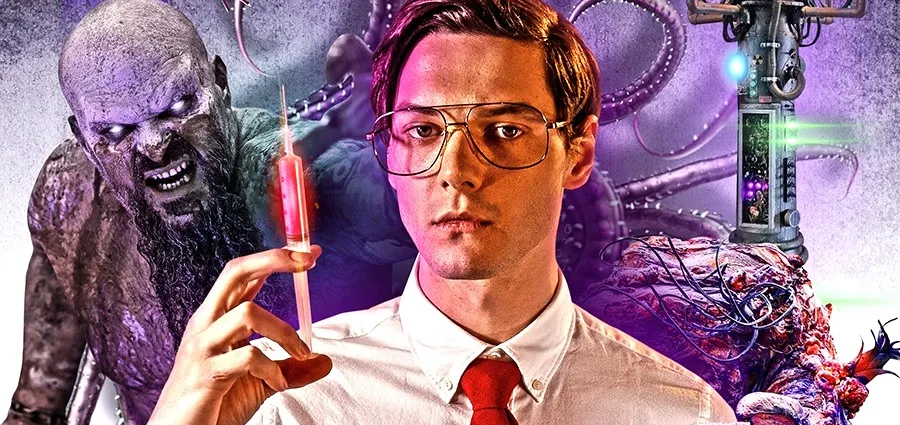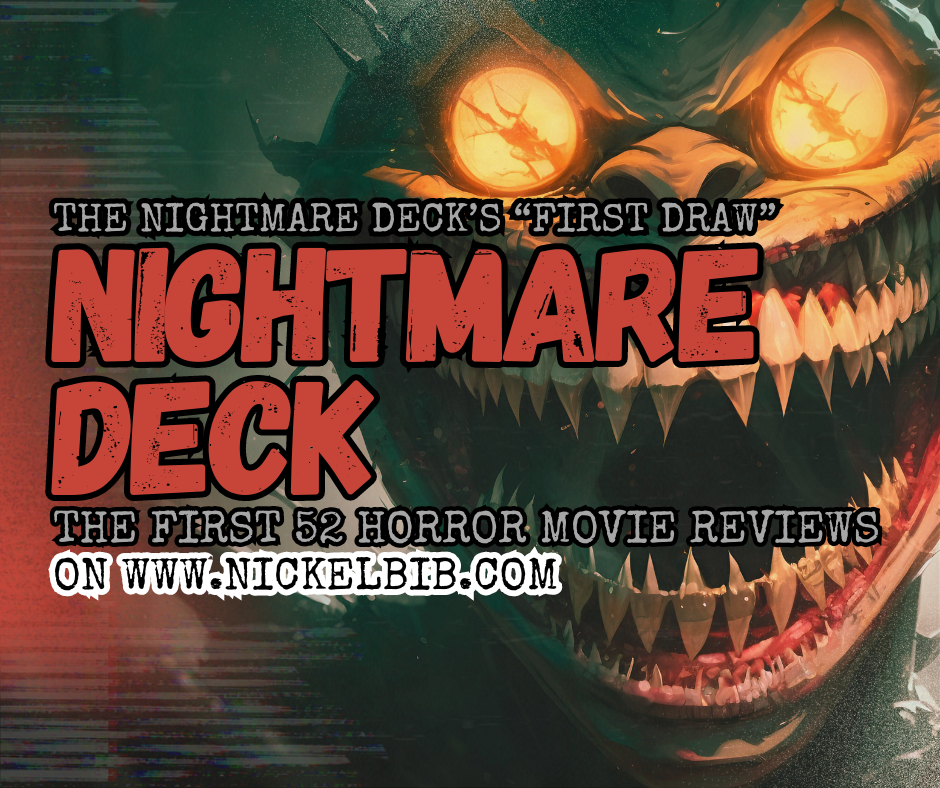I have talked about Full Moon Features at length over the years. I haven’t always met their filmography with glowing reviews or even a particularly warm reception, but I like to think I always try to at least get across that Full Moon has its charm. I like a lot of their movies! I genuinely enjoy Stuart Gordon‘s film Re-Animator, and I consider Head of the Family and The Creeps to be truly entertaining, goofy horror cinema. Unfortunately, re-experiencing certain films in Full Moon’s catalog does open up some awful truths – the Subspecies series (at least the first two I have reviewed) are kind-of boring, The Meridian: Kiss of the Beast is a creepy rape-romance film, and The Killer Eye is real bad.
Like a lot of horror history, there is a lot of good and a lot of bad, and sometimes the bad outweighs the good. I have reviewed just over a dozen Full Moon Features so far, and I would say that is a fair assessment of my recent reassessment.
On the bright side, we have barely scratched the surface yet. I have only reviewed the first two Puppet Master movies (as well as Blade: Iron Cross and Puppet Master: Doktor Death), which means I have barely begun my journey on Nickelbib with the pint-sized heroes (coming up is Puppet Master III, which I remember fondly as my favorite of the series). I haven’t talked about Re-Animator or the Killjoy franchise, and I haven’t talked about the Trancers franchise (and I enjoyed me some Tim Thomerson).
Although From Beyond isn’t necessarily moving toward any of those films, the film does have a lot to be excited about.
Admittedly, if I am being honest, I don’t have a lot of memories about From Beyond as a film. I remembered watching it, but I can’t at all remember whether I liked it or not.
All I know is that film stars Barbara Crampton and Jeffrey Combs, and was directed by Stuart Gordon. If you’re a horror history nut like myself, you understand why that is such a promising cast and crew. A year prior to From Beyond’s release, Stuart Gordon directed Re-Animator, starring both actors. The film was charming and eccentric, and fun and weird, and it remains comfortably on the Mt. Rushmore of Full Moon Features and Empire International Pictures’ finest films. Jeffrey Comb’s kills it as the beady-eyed Herbert West and Barbara Crampton makes her first steps toward becoming a horror legend in her own right (1986 was also the year Barbara Crampton appeared in another film – the very fun B-movie horror film Chopping Mall). So, we have the crew from one of Full Moon (again, technically Empire’s) best films and they are once again covering H.P. Lovecraft. Although this film isn’t as revered as Re-Animator, it is among the more popular and respected films of the company. I’m optimistic.
The film begins in classic fashion – a cold open that introduces us to the core concept and shocks the senses straightaway before segueing into the film’s opening credits. Jeffrey Combs’ character is still a scientist who finds little guilt dealing in forces he shouldn’t, not unlike Re-Animator, but this time around he is less of a standoffish, egotistically neurotic mad scientist and more a scientist that has been scared out of his wits. After toying with a machine called the Resonator, capable of seeing things that can’t be perceived by normal reality – third-eye, third-dimension, that kind of stuff, the scientist is left rife with fear. Barbara Crampton plays a scientist as well, who finds herself trying to rehabilitate the spiraling doctor and make sense of the device that, in a mere flicker, was able to cause so much damage.
In other words, it is a less interesting character for Jeffrey Combs and, probably, a more interesting character for Barbara Crampton this time around. Unlike Re-Animator, she is less a vehicle for the film’s campy humor and eighties-required nudity, and more a central character in the film. This is not, however, to say that she isn’t also there for additions to the film’s campy humor and eighties-required nudity.
Unfortunately, where this leads us as far as protagonists are concerned isn’t very interesting. The performances, for what they are, are good, but I wouldn’t necessarily single them out. Combs’ character spazzes out and warns about the unknown dangers of The Resonator, whereas Crampton’s character feels the ends justify the means for the benefit it could have for society. They are straightforward roles and both play them well, but they’re straight man characters with little else about them. This is a different beast than Re-Animator. From Beyond is less concerned with the characters themselves or, at least, less concerned in providing unique, interesting characterizations for each of them, and more enamored by the high-concept of The Resonator itself, banking on its mystique to sell the film.
The special-effects are practical and suitably wet and gross, not on-par with the best 1986 horror film (The Fly), but cut from a similarly disgusting clothe. The score by Richard Band is suitably thematic as well.
The Resonator is similar, on a basic level, to the puzzle box from Hellraiser. Although, whereas Clive Barker created the world in Hellraiser as something of a dimension built in the foundation of extreme sadomasochism, Lovecraft’s mythology instills the sentiment of something deeper than that, a mythology of gods whose predilections are beyond human comprehension. At the end of the day, it amounts to something vaguely similar in film. There is a sexual component in the Hellraiser franchise, a certain warped beautiful torment and a sensory overload, and that fits well to what they seem to be going for with The Resonator.
Where I think From Beyond fails, at least in my opinion, is by not having anything particularly striking under the hood.
If you don’t have strong characterizations (which, as prefaced, I believe this film lacks), then you have to be able to be for certain that your high concept is enough to make the viewer’s investment feel worthwhile. Unlike Hellraiser, which Roger Ebert once called ‘a bankruptcy of imagination,’ From Beyond isn’t particularly gory. (Nor am I suggesting it needed to be.) It isn’t without bloodshed, but it isn’t anything that will stay with you. The most distinctive visual they have in this film is of a scientist that has been afflicted with something brought on by The Resonator, turning him into a slimy, deformed monster. It’s a decent visual, for certain, but there isn’t really anything to grab you. They try to build to this mystique about The Resonator, but the film’s efforts aren’t reinforced by a satisfying eventual payoff. Even if you took hid from the violence of Hellraiser, by the end of the film, you would still be met by the captivating, unique presence of each Cenobite. This film, for the most part, has little under the hood beyond what’s under Barbara Crampton’s hood and a monster that, while par for the course, isn’t enough to leave me caring about or intrigued by the Resonator.
I also don’t feel like this is an instance where less is more in a film. I didn’t so much feel like I was buying into the mystique and aura of the Resonator itself, where I was so amped up by the unknown of it all, but more like I saw the Resonator as something of a life-raft, capable of making the film add up to something more memorable and distinct. More would’ve been more.
Although it isn’t without a layer of charm, From Beyond isn’t a film I would wholeheartedly recommend. It is a more conventional film than Re-Animator, and is, at the same time, more nonsensical and one-dimensional. The actors deliver a good performance, the production design, for the most part (you may have to fight off a chuckle at the floating purple fish), looks good. I enjoy the score and the story itself is both familiar but a good concept. Unfortunately, I was unable to become invested in its storyline and, frankly, my enthusiasm for the film depleted like a balloon as it progressed. I would recommend it to anyone who is committed to finding the best of Empire / Full Moon, because it has enough people who do regard it well that it is worth seeing for yourself. However, it isn’t a film I would single out amongst the catalog.






GIPHY App Key not set. Please check settings